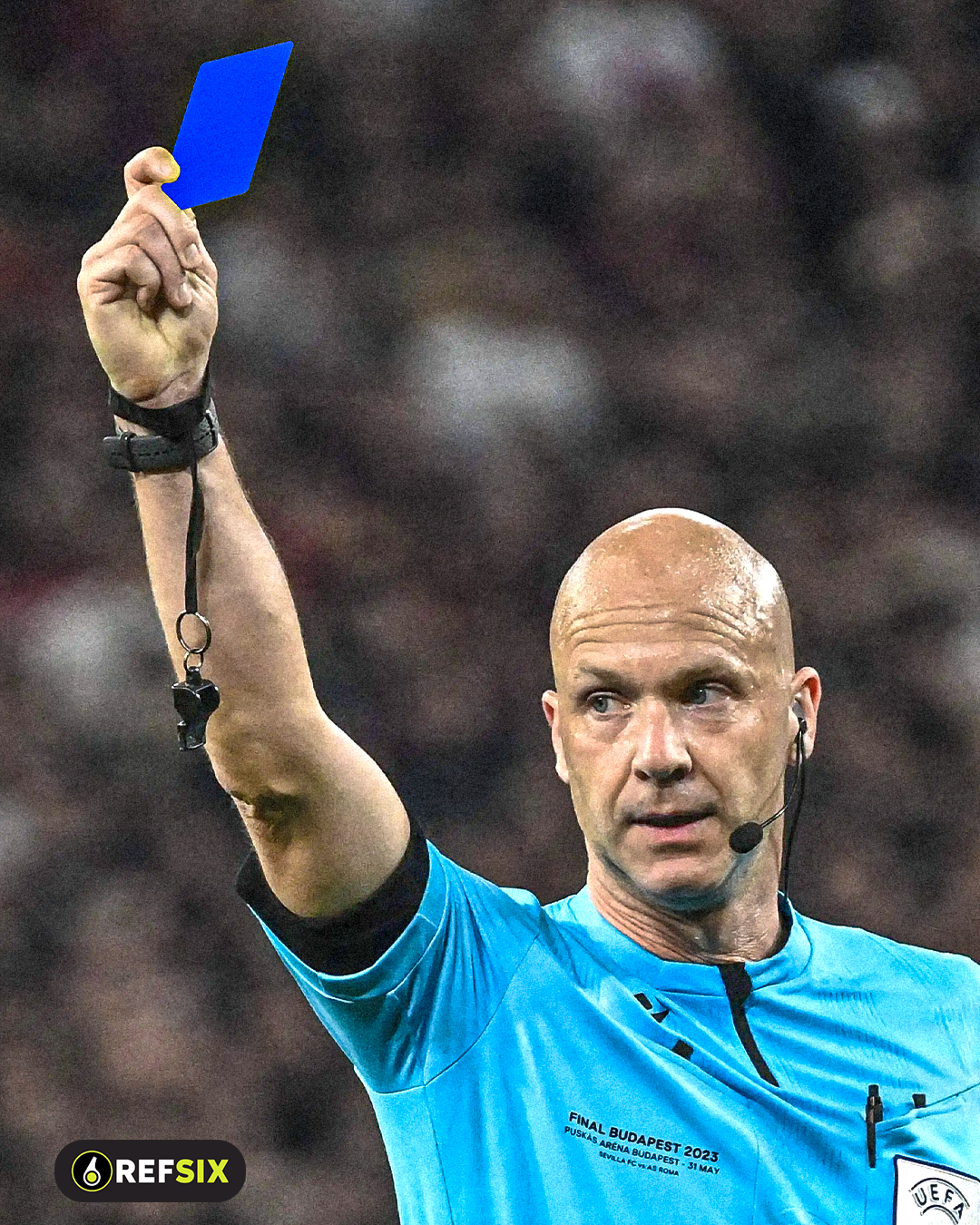Blue cards in Football: The new plan for cynical fouls and dissent
Football is a game of passion, skill, and sometimes, controversy. Referees have the power to enforce the rules of the game by issuing yellow and red cards to players who commit fouls or show dissent. But what if there was another option? A way to punish minor offences without sending a player off permanently? Enter the blue card…
What is a blue card?
A blue card is a new type of penalty that football’s lawmakers, the International Football Association Board (IFAB), are planning to trial in some competitions. A blue card would result in a player being sent to a sin-bin for 10 minutes, during which time their team would play with one less player. The idea is to deter players from committing cynical fouls or showing dissent to the referee while avoiding the harshness of a red card.
How would it work?
According to the proposals, a blue card would be shown alongside the existing yellow and red cards, and would have different consequences depending on the situation. For example:
If a player receives a blue card, they would have to leave the field for 10 minutes and wait in the technical area. Their team would not be allowed to substitute them during this time.
If a player receives a second blue card, they would also be shown a red card and be permanently dismissed from the field. Their team would play with one less player for the rest of the game.
If a player receives a combination of one blue and one yellow card, they would also be shown a red card and be sent off.
If a player receives a yellow card after returning from the sin-bin, they would not be shown a second yellow card, but would still be cautioned.
If all this sounds quite complex… it kind of is! Referees have enough to think about already. That’s why REFSIX exists. We already have a sin bin feature which helps a referee track multiple players and the time they need to come back on. We even have the logic described above embedded within the app, so you won’t make the wrong call for a player who’s already been binned. Download the app today for free.
Why is it being introduced?
The main reason for introducing the blue card is to improve the behaviour of players and the respect for the referees. The Ifab believes that sin-bins would reduce the number of dissent and cynical fouls, as well as the risk of violent conduct and retaliation. Sin-bins have already been used at grassroots level in some countries, with positive results. The Football Association reported a 38% reduction in dissent across 31 leagues that piloted sin-bins in 2018-19.
Another reason for the blue card is to make the game more exciting and fair. Sin-bins would create more space and opportunities for the attacking team, while also giving the defending team a chance to recover and reorganise. Sin-bins would also avoid the situation where a team is reduced to 10 players for a long period of time because of a minor offence, which could affect the outcome of the game.
When and where will it be trialled?
The Ifab is expected to announce the details of the blue card trials on Friday, 9 February 2024. It is not yet clear which competitions will be involved, but the FA Cup is one of the possible candidates. The Premier League, however, has ruled out being part of the initial trials. The trials are also unlikely to take place in the Champions League or the European Championship, as UEFA has expressed its opposition to the idea.
What are the pros and cons?
The blue card has its supporters and critics, who have different views on its impact on the game. Here are some of the pros and cons of the blue card:
Pros
It would improve the behaviour of players and the respect for the referees.
It would reduce the number of dissent and cynical fouls, as well as the risk of violent conduct and retaliation.
It would make the game more exciting and fair, by creating more space and opportunities for the attacking team, while also giving the defending team a chance to recover and reorganise.
It would avoid the harshness of a red card for minor offences, which could affect the outcome of the game.
Cons
It would complicate the rules and the decision-making process for the referees, who would have to deal with three types of cards and different combinations of them.
It would disrupt the flow and continuity of the game, by forcing players to leave and re-enter the field at different times.
It would create confusion and inconsistency among players, fans, and media, who would have to keep track of the different penalties and their consequences.
It would change the nature and spirit of the game, by introducing a new element that is not part of the traditional football culture.
Conclusion
The blue card is a controversial proposal that aims to improve the behaviour of players and the respect for the referees, while also making the game more exciting and fair. The blue card would result in a player being sent to a sin-bin for 10 minutes, during which time their team would play with one less player. The blue card would be shown alongside the existing yellow and red cards, and would have different consequences depending on the situation. The Ifab is planning to trial the blue card in some competitions, but the idea has met with resistance from some stakeholders, who fear it would complicate, disrupt, and change the game. The blue card is a bold experiment that could revolutionise football, or ruin it.



